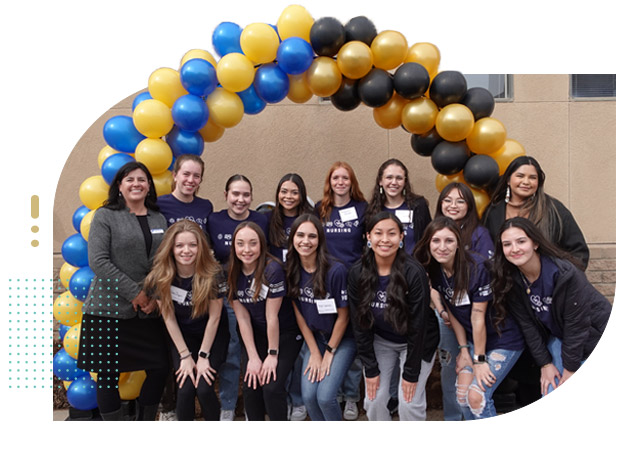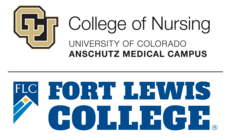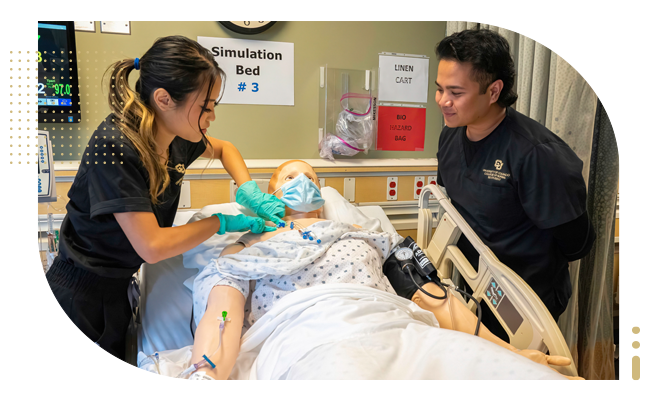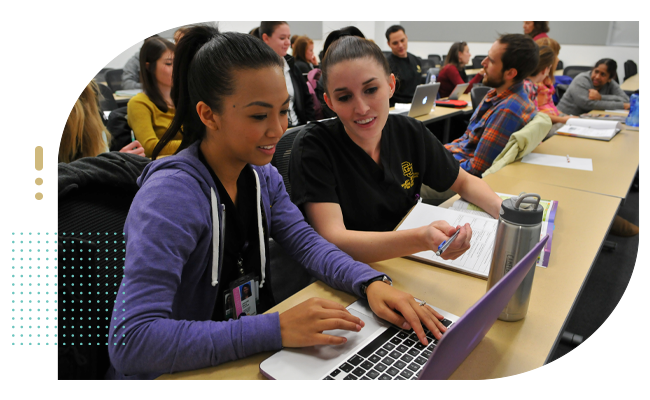Bachelor of Science
Fort Lewis College/CU Anschutz Nursing Path
Study at Fort Lewis College and earn a CU Anschutz College of Nursing degree. In this pathway, you'll train for an in-demand career in nursing while enjoying all that the beautiful Fort Lewis Campus has to offer. You'll study culturally sensitive care, focusing on serving Southwest Colorado's rural and Indigenous communities. You’ll gain nursing skills through clinical simulations, real-world experience at healthcare facilities, and in-depth classes, taught by expert CU Anschutz Nursing faculty.

Ideal if you...
Are a Fort Lewis College student, alumni or community member in the four corners region
![]()
Want to work while in school
(doable early on, tough during clinicals)
Prefer a steady learning pace
Overview
Format
In person
All classes are held at Fort Lewis College in Durango, CO.
Avg. time to complete
2-4 years
Depending on prerequisite completion
9 semesters
Exam prep
NCLEX
When you finish the program, you can take the National Council Licensure Examination (NCLEX) to become a licensed nurse.
Scholarships available
Scholarships honoring FLC’s Native American Tuition Waiver and other support is available (contingent on funding). The average award is $4,000 (2023 data).
Clinical placements set up for you
We match you with healthcare agencies and communities for your clinical training. You’ll be placed at hospitals and health clinics in Southwest Colorado and nearby New Mexico where you'll get high-quality, hands-on experience taking care of patients and communities.
Hands-on, high-tech education center
Learn in a newly renovated, high-tech, interactive clinical education center.

#1
Nursing bachelor’s program in Colorado*
Career
When you finish the BS Fort Lewis College/CU Anschutz Nursing Pathway and pass the nursing licensure exam, you can deliver culturally-sensitive, patient-focused care to Indigenous and rural communities in Southwest Colorado. This degree can also set the stage for you to earn a graduate degree in nursing.
What you can do
- Treat patients
- Administer medications
- Perform assessments (taking vital signs, patient evaluation)
- Document patient information
Who you can care for
Becoming a nurse opens many career doors and allows you to treat a wide range of patients. You can also focus on one area of nursing (ER, labor and delivery, oncology), depending on where you want to work.
Where you can work
- Hospitals
- Nursing homes or long-term care facilities
- Schools
- Public health agencies
- Outpatient clinics
Admissions
Deadline(s)
| Start term | Application opens | Priority deadlinetooltip | Extended deadlinetooltip |
| Fall 2026 | February 1, 2025 | September 15, 2025 | January 15, 2026 |
Get started
1
Check the requirements
Understand the admissions requirements like how many letters of recommendation you need and what courses should be on your transcript.
2
Start your application
Work on your application and submit it through NursingCAS.
Curriculum
Two years of prerequisites
You’ll take two years of prerequisites at Fort Lewis College. These courses give you a high-level understanding of science and math fundamentals. You'll take classes like physiology, algebra, anatomy, and psychology. If you have already taken these courses or hold a college degree, your prerequisite path may be significantly shorter.


Two years of nursing training
You’ll continue your education at Fort Lewis College when you finish your prerequisites. CU Anschutz Nursing has its own building on campus and classes will focus more on healthcare and nursing. These courses include nursing research, pathophysiology, and nursing care for children and families.
Your study plan will be similar to the CU Anschutz Nursing BS Traditional Pathway.
Skills and knowledge you'll gain
Costs
Important note: Please refer to Fort Lewis College's tuition and fees to calculate costs for the first two years of your education. The following tuition and fees are only applicable for the last two years of this pathway when you complete CU Anschutz Nursing coursework.
| Residency status | Estimated CU Nursing tuition** |
| Colorado residents | $40,062 |
| Colorado residents + College Opportunity Fund Stipend | $32,406 |
| Eligible Western state residents** | $60,093 |
| Nonresidents | $69,960 |
| Additional expenses | Time frame | Estimated costs |
| Matriculation fee | One-time | $140 |
| Other fees | By term | Fall $382, Spring $222, Summer $222 |
| Books and supplies | Total for program | $2,000 |
| CU health insurance (may be waived with proof of comparable personal health insurance) | By term | Fall $2,742, Spring $3,838, Summer $1,095 |
![]()
I’ve had family members who’ve been sick, and my mom is a nurse, so I felt like I wanted to help people and give back to my family and community... I’m excited for this program. Since the program is so small, I’ll get to discover everything and get a better hands-on experience.
Bailey Martinez, Fort Lewis College Pre-Nursing Student
Become the nurse looked to first 
Get your degree from the top nursing college in Colorado. Start your journey to become a CU Anschutz nurse today.